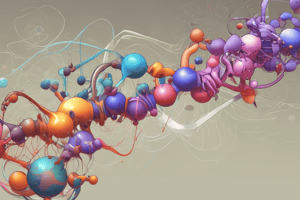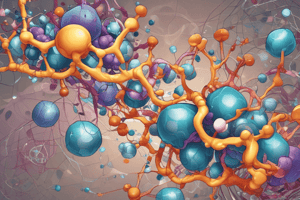Podcast
Questions and Answers
What is the primary role of proteins in living organisms?
What is the primary role of proteins in living organisms?
- Genetic information storage
- Facilitating signal transduction
- Energy storage
- Structure, function, and regulation of tissues and organs (correct)
Which type of biomolecule is primarily involved in energy storage?
Which type of biomolecule is primarily involved in energy storage?
- Nucleic Acids
- Proteins
- Carbohydrates (correct)
- Lipids (correct)
What is the main purpose of enzyme kinetics in biochemistry?
What is the main purpose of enzyme kinetics in biochemistry?
- Investigating the interactions of biomolecules
- Studying DNA replication
- Measuring rates of enzyme-catalyzed reactions (correct)
- Analyzing the structure of proteins
What do nucleic acids primarily do in living organisms?
What do nucleic acids primarily do in living organisms?
Which technique would you use to separate proteins based on size?
Which technique would you use to separate proteins based on size?
In biochemistry, catabolism refers to which of the following?
In biochemistry, catabolism refers to which of the following?
What is the significance of signal transduction in cells?
What is the significance of signal transduction in cells?
How does biochemistry contribute to advancements in agriculture?
How does biochemistry contribute to advancements in agriculture?
Flashcards are hidden until you start studying
Study Notes
Biochemistry
-
Definition: The branch of chemistry that deals with the chemical processes and substances within and related to living organisms.
-
Key Areas of Study:
- Molecular Biology: Interaction of biological molecules, including DNA, RNA, and proteins.
- Enzyme Kinetics: Study of the rates of enzyme-catalyzed reactions.
- Metabolism: Chemical processes that occur within a living organism to maintain life, divided into catabolism (breaking down molecules) and anabolism (building up molecules).
- Signal Transduction: Processes by which cells respond to external stimuli through chemical signals.
-
Major Biomolecules:
- Proteins: Made of amino acids; essential for structure, function, and regulation of body tissues and organs.
- Nucleic Acids: DNA and RNA, responsible for genetic information and protein synthesis.
- Carbohydrates: Sugars and starches; important for energy storage and structure.
- Lipids: Fats and oils; involved in energy storage, membrane structure, and signaling.
-
Techniques Used:
- Chromatography: Separation of biomolecules for analysis.
- Electrophoresis: Method to separate nucleic acids or proteins using an electric field.
- Mass Spectrometry: Identifies and quantifies biomolecules based on mass.
- NMR Spectroscopy: Used to determine the structure of organic compounds and biomolecules.
-
Applications:
- Medicine: Understanding diseases and developing treatments (e.g., drugs, vaccines).
- Agriculture: Genetic engineering of crops for better yield and resistance.
- Biotechnology: Use of biological systems for industrial applications, such as fermentation and enzyme production.
-
Importance:
- Provides insight into the molecular mechanisms of life.
- Helps in the development of new therapeutic strategies.
- Facilitates advancements in nutrition and health sciences.
Definition
- Biochemistry studies chemical processes and substances in living organisms.
Key Areas of Study
- Molecular Biology: Investigates interactions of molecules like DNA, RNA, and proteins.
- Enzyme Kinetics: Focus on the rates and mechanisms of enzyme-driven reactions.
- Metabolism: Encompasses all biochemical processes, including:
- Catabolism: Breakdown of complex molecules for energy.
- Anabolism: Synthesis of complex molecules from simpler ones.
- Signal Transduction: Mechanisms through which cells interpret and respond to external signals.
Major Biomolecules
- Proteins: Composed of amino acids; vital for tissue structure, function, and regulation.
- Nucleic Acids: DNA and RNA; carriers of genetic information and key players in protein synthesis.
- Carbohydrates: Sugars and starches; crucial for energy storage and cellular structure.
- Lipids: Fats and oils; essential for energy storage and forming biological membranes.
Techniques Used
- Chromatography: Technique for separating biomolecules to enable detailed analysis.
- Electrophoresis: Method for separating nucleic acids or proteins through an electric field.
- Mass Spectrometry: Analyzes biomolecules by determining their mass, facilitating identification.
- NMR Spectroscopy: Technique used for elucidating structures of organic compounds and biomolecules.
Applications
- Medicine: Contributes to understanding diseases and aids in developing drugs and vaccines.
- Agriculture: Involves genetic engineering to enhance crop yield and resistance.
- Biotechnology: Applies biological systems for industrial purposes, including fermentation and enzyme production.
Importance
- Enhances understanding of molecular mechanisms crucial for life.
- Drives innovation in therapeutic strategies, improving disease treatment.
- Supports advancements in nutrition, health sciences, and agricultural productivity.
Studying That Suits You
Use AI to generate personalized quizzes and flashcards to suit your learning preferences.



